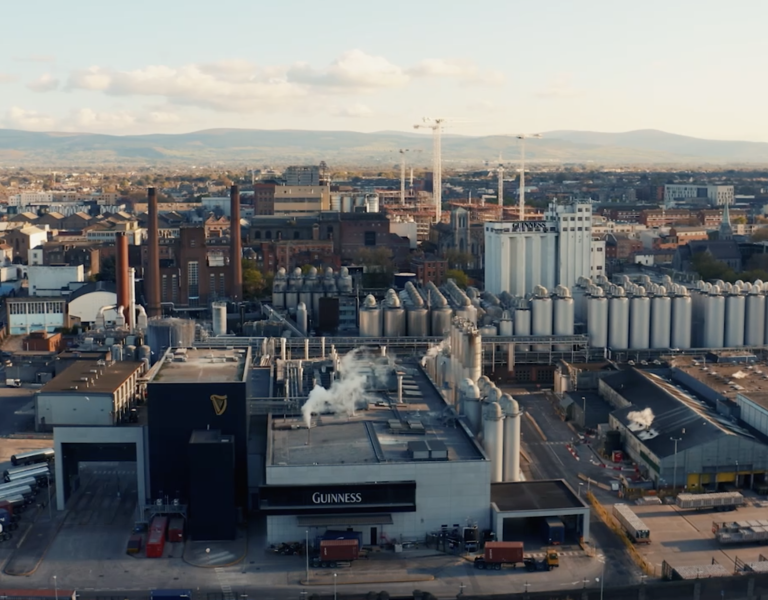Diageo invests in St. James's Gate Brewery through EXEED
Over the next three years, significant investments are planned for Diageo's St. James's Gate Brewery site through EXEED.
Key Achievements
Several different options for more efficient heating identified
The Design for Energy Performance workshops & energy modelling identified new, more efficient heating options, with potential for hot water energy stores
EXEED has led to heating pathways feeding into sustainability plans
Since the completion of the Stage 1 EXEED study, the EED Energy Savings Register, process heating pathways and their strategic assessment have all fed into the site sustainability masterplan exercise
Introduction
St. James's Gate Brewery is owned by Diageo Ireland, the Irish branch of the multinational alcoholic beverage company, behind brands including Guinness and Smirnoff.
St. James's Gate Brewery produces over 7 million hectolitres of beer per annum. Stout production makes up just over 70% of this figure, while ale and lager production make up the balance of slightly under 30% of the total volume.
The brewery has three brewhouse lines, producing stout, ale/lager, and liquid for Diageo's concentrate process. There are two fermentation blocks, for stout and for ale/lager. Fermented and clarified product is stored in bright beer tank (BBT) and then routed for final packaging, either on site in the keg plant, or filled into road tanker and delivered off site for final packaging in Belfast or Runcorn in the UK.
All the processes require significant utility input and there is a large CHP plant on site providing heat and power to the brewery. Additionally, there are large secondary utility plants, namely water treatment, compressed air, CO2 Recovery and Storage, Nitrogen Generation, Refrigeration and Wastewater Neutralisation.
These assets are all contained on the St. James's Gate site, the site is accredited to ISO 50001 and has an up-to-date energy management system and meter reports in place and encompasses multiple energy services in the production of alcoholic and non-alcoholic beverages.
About the project
There is a significant opportunity for the St. James's gate brewery to leverage the EXEED (Excellence in Energy Efficient Design) managed process to help develop a strategy that will deliver on Diageo's 2030 GHG targets of zero carbon emissions (globally).
Over the next three years significant investments are planned for the St. James's Gate Brewery site to achieve this.
The following projects were all assessed in parallel:
- Nitrogen (N2) Plant Upgrade
- Keg Plant Replacement
- Deaerated Water System Upgrade
- Tanker Station Upgrade
- Upper-Level Disconnection Project
- Overall Heating Strategy for the Brewing Process
By taking a step back and looking at the brewery operation from end to end we have been able to identify significant opportunities to eliminate "waste", capture energy previously lost to drain and atmosphere, and recycle it to reduce the dependency on the use of fossil fuels in our operations. The (EXEED) program has been a key step in delivering our aim to eliminate the use of fossil fuels on site and deliver a carbon neutral operation.
Results
The energy balance study of the current operation showed that of approximately 100 GWh per annum of energy required for heating processes, approximately 12% of this is lost through system losses i.e., flash condensate losses, steam leaks.
The EXEED evaluation across the site has identified opportunities for energy efficiency and waste elimination. Overall, an opportunity for up to 88,000MWh of thermal energy reduction has been identified so far, which can be achieved through the clever integration and implementation of tried and tested technology solutions.
This level of energy saving equates to a reduction in site CO2 emissions of 50%.Using the EXEED process, we have also identified further longer-term opportunities to reduce energy consumption well beyond this figure.
What's next for Diageo Ireland
Several projects will move into execution phase.
The known energy balance of the entire brewing process was analysed and there the team tried to identify the critical energy services. This endeavour identified four different pathways which could deliver an energy efficient and decarbonised brewing process - this led to the insight that in theory the specific energy consumption could be reduced to ~ 1/3rd of the current value. EED in this instance has shown a level of efficiency gain and demand reduction over and above what a standard 'decarbonisation study' would identify.
The next steps from this piece of work are to look at the operational and economic practicalities of making this insight a real-world solution.
